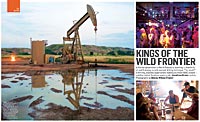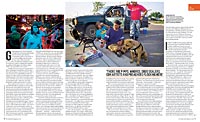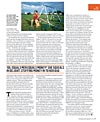» home » portfolio » reportage
Kings of the Wild Frontier
A former ghost town in North Dakota is booming — thanks to oil and fracking, a controversial drilling technique.The result? A thriving, anarchic place where waitresses make $800 a night — and the rest of America wants a job.
GNASHING HIS TEETH, wired on a dual cocktail of crystal methamphetamine and alcohol, the pale-skinned, 20-something pulls up his sleeve to reveal three digits tattooed on his forearm: 666. A blonde, braless woman with a sheath knife dangling around her waist and a sweaty red bandana hanging around her neck clings to his skinny frame. "Hello," the man offers. "I'm Lucifer."
Tonight, the devil is busy at Champs Place, a filthy, windswept establishment with a drive- through hard liquor outlet tacked to the side. It sits on the side of a major highway in North Dakota. The place barracks every minute or so with the thunder of 18-wheelers and the prairie winds. Not that anyone inside, revelling in the pure pandemonium, takes note. We came looking for trouble, and now we've found it.
This is oil fever in boomtown. Earlier, the same blonde had been making out with another woman and a man inside the smoky and chaotic environs of the bar. Roughnecks with hands like baseball mitts are lurching around tossing down $100 bills on the bar, throwing back whisky chasers with Budweiser, drinking themselves to obliteration. A man mountain with a US paratrooper tattoo on his bicep lets slip he worked for Special Forces before heading out west to make his fortune. "This is a dog eat dog town," he slurs. Scuffles break out every so often in the sweaty fugue. And now, at closing time, as we flood outside, violence is only a step or two away. A drunken man with a beard like wire wool and a ramshackle lope climbs up into the cab of an enormous Ford F150 shouting racist epithets. "I sure hope we ain't got none of them here. Yee haw!"
This is the weekend warm up; Thursday night in Williston. Around five years ago, this blink- and-you-miss-it, flyspeck in the middle of a desolate nowhere, was just another Midwest ghost town where the 12,000 residents left their doors unlocked at night and one local remembers only two black students ever attending the high school. Today, it's on steroids, bursting at the seams: every day, economic refugees from all over recession- racked America flock to this little town, which has exploded four fold, to around 40,000. The infrastructure groans. The Applebee's restaurant, set across a barren stretch of wasteland, one of the few restaurants in Williston, is second only to the franchise in New York's Times Square in terms of business. In the toilet stalls are posters advertising the services of lawyers for those injured on oil rigs. The waitresses make at least $800 in tips on a good night from sex-starved men. All this is driven by the thousands of men sleeping in their cars, camping in fields or parked up in recreational vehicles (RVs) on any ground still available. All are on a quest to seek their fortune. Williston is a frontier oil boomtown for the greatest oil consumer in the world.
In 2010 the US, for the first time in 13 years, imported less than half its oil from foreign countries. This region last had an oil boom in the early 1980s, but the blackstuff is deep at 10,000ft. It was not cost effective to drill to reach it. New technology, which enabled drillers to go horizontal as well as vertical, made the oil easier to reach. Then the advent of hydraulic fracturing — "fracking" — which involves shooting a mixture of water, chemicals and sand into the rock to fracture it and release the oil further, ensured it was economically viable. The further revelation that there could be up to 400 billion barrels of oil under the American Midwest caused a stampede. This is the biggest oil find in the US in 30 years. The Bakken oil fields once had 300 wells; today there are over 6,000, with another 30,000 planned.
Today Williston is a town where strippers at the two strip clubs make $3,000 a night, according to CNN, and you can make $70 an hour driving a pick-up truck. The sheriff tries to keep a lid on the mayhem by busting up the nightly bar fights and disrupting the hookers and drug dealers from all over America who cater to the 27,000 out-of-towners looking for a place to spend their newly acquired fortunes in the back end of beyond. "There are pimps, whores, drug dealers, con artists and preachers flocking here," says Mike Boyce, a construction worker recently arrived from Las Vegas, staying in one of the temporary campsites that ring the town. "It's like the California Gold Rush. It's the Wild West all over again."
Across the great plains, on the approach to Williston we pass "man camps": serried rows of temporary barracks-style housing that hold 10,000 workers. New migrants flood past us on the highway. They come in camper vans, packed to the gills, gas-guzzling sedans lined with neatly pressed shirts for potential job interviews.
Most economic migrants here are homeless. Many end up heading straight to the Concordia Lutheran church, which stands near a bowling alley. The pastor has thrown open his doors to the wave of men crashing into Williston. "I think it's great what the pastor does," says Ryan Martin, sleeping below an image of Christ under a celestial beam of light. The 31-year-old is from Portland, Oregon, where he has a degree in web design and a masters in psychology, but carries $45,000 debt from student loans. He heard about the town on the news and arrived shortly after. He has a job in a vehicle parts store and is now looking for a second. Finding affordable accommodation is more elusive.
The pastor's policy of welcoming everyone has not been met favourably by a deeply conservative community, wary of outsiders. The Williston Herald attempted to expose the pastor for offering shelter to transient sex offenders. "Sex offenders are the pariahs in our community," says the pastor. "I'm not sure kicking them out is the best policy."
Relations with the local media and the pastor are at an all time low since he successfully took out a restraining order against one of the paper's reporters. "I tell the people of Williston: these are your neighbours!" roars the pastor stabbing his desktop with an index finger. He throws his arms wide and himself backwards on his chair in frustration. He jerks forward. "Fear is leading this community."
None of those fears were allayed with the high-profile murder of mother and maths teacher, 43-year-old Sherry Arnold. She disappeared from Sidney, Montana after a morning jog, leaving only a running shoe at the side of the road. Two men, Lester Waters and Michael Spell were drifters who had come to the Williston area looking for work. They murdered Arnold after a crack cocaine binge.
The two bought a shovel, along with bread and meat, from the Williston Walmart. Shortly thereafter they buried her in the foetal position in a 2ft-deep hole outside Williston. The men returned the shovel to Walmart claiming a refund, which was all captured on video. They were caught not long after. Pastor Jay visited one of them in prison.
IT FALLS TO SHERIFF Scott Busching to fight the lawlessness that is engulfing Williston. A suitably gruff former paratrooper and Vietnam veteran with a hulking 6ft frame and a drooping Wyatt Earp style moustache, he was raised as a farm boy in North Dakota. A deactivated claymore mine sits on his windowsill. The sheriff moved to the town after the first oil boom in the 1980s. He had over 20 years of peace before it erupted again. Now he enforces his old-school style justice on a population that nobody knows how big it really is. "They keep losing count," he says.
"Everyone in the town was saying how great this boom was going to be for money and jobs," deadpans the sheriff. "But I sat down with my deputy and said, "This ain't gonna be good. It's gonna suck." Sure enough the enthusiasm of many long-term residents transmuted to outright horror. Many simply packed up and left. "We have added a lot of… culture, to our society, which is good," he says. "But some people are uncomfortable with that. They feel a sense of loss in the community because of that. This town will never the same," he says.
Even the sheriff admits that he was thinking of joining them. The house he bought in the 1980s for $80k is now worth half a million. "I saw everyone running away and it started to piss me off," he says. "If we can get through this, stick around for the infrastructure to catch up, get some restaurants and amenities, then this could be a hell of a town." He adds: "There's a lot of people here who are damn good folks. They have a house and a family back in Ohio or wherever, and they'd rather come out here and tough it out and send a pay cheque home than sit on the kerb and have the government feed them."
The first problem was the explosion in vehicle accidents caused by the huge numbers on the road. The sheriff states that each oil rig commands at least 2,000 truck trips to bring in water, take oil out and general service. "That's a lot of traffic on the road," he says. "When we have an accident it's
a big one because these are 18-wheeler trucks involved. It's almost always a fatality."
The sheriff says the current boom started in 2009 and since brought with it three waves of migrants. "First, we had lawyers, engineers; the second wave brought construction workers. Now we got the third wave," he says, fighting the feeling of disgust that his large, ruddy face betrays. "I call them, the parasites."
As a case in point the sheriff takes us into the robust confines of the jail where a darkened control room overlooks four pods containing inmates in black and white striped jumpsuits. They are split into four groups; the convicted, un-convicted, women and, says the sheriff, "the incorrigibles…" He adds: "The shitheads," by way of explanation. There's an extra secure cell with rubber-lined walls and a solid steel door with triple reinforced glass, wrecked from the night before. "Iraq veteran, Army Ranger back from several tours up here looking for work," explains a deputy. "Three men jumped him and put a knife to his buddy's neck. He knocked them all out cold. When we got him back here he punched the glass door and smashed it. There wasn't even a bruise on his hand. The next day he was sweet as can be."
TANKERS RATTLE PAST carrying water for fracking. Newly-minted oil workers, desperate to find toys to spend money on, rip past the shops in shiny Ford Mustangs and Chevrolet Camaros while others on chromed Harley-Davidsons wobble uneasily in brand new leathers. Yet the only places which draw an active crowd of consumers are Whispers and Heartbreakers. A steady stream of men parade in and out at most hours of the day and night. These are Williston's strip clubs.
"You got any knives or guns," asks the bouncer at Whispers on a Friday night, a man with more steel hanging from various parts of his face than the Terminator. "No?" he says, somewhat disappointedly. "Okay, in you come."
To the bump and grind of a house track, Willow ("Duh! No, of course it's not my real name, stupid!"), a svelte 27-year-old single mum from Salt Lake City, writhes on the lap of an obese, gargantuan man wearing beige shorts that almost reach to his armpits. The club is dark and cavernous with a stage and pole set back in a corner, while a waist-high barrier protects the women from a pack of testosterone engorged males making more money than they ever dreamed of in their life. Willow vaults from the man's lap and spread- eagles herself on the barrier offering a gynaecological view that sets the place alight with a curious mixture of wolf whistles, leers and unabashed delight as a group of men press on each other's shoulders craning to get more medical insight.
Willow arrives at the bar exhausted but in good spirits, in a white bikini and hood, a less wholesome version of Princess Leia in the Empire Strikes Back. She waves a budget light saber. "Oil equals men equals money!" she squeals in delight, having difficulty cramming all the high denomination dollar bills that were scattered over the dance floor like confetti, in appreciation of her talents, into her bag. "Course, I was thinking of going to medical school and becoming a heart surgeon," she tells me, grinding the life out of a piece of gum and slurping a vodka tonic. "Now I'm a stripper in North Dakota!"
By midnight there is no available floor space left at Whispers. A drunken man at the bar with a huge moustache that almost covers hisblotched face slurs: "I f***ing hate this town. I arrived before all this and I could get laid any night of the week I wanted. Now, I gotta drive 200 miles just to get laid!" But he no longer has to work as he rents his four- bedroom trailer home out.
Willow has a waiting list for lap dances, conducted in the back of the club behind a curtain. She emerges covered in sweat to take a break. "I just had this fat trucker, telling me how he has a fender on the front of his truck to run people over. It really creeped me out." Willow told the DJ about the man and returns to finish the 30 or so lap dances she has left. Nezzy, 23, is one of Williston's success stories. He was making $400 a month at the Coca-Cola factory in Atlanta, Georgia. The city is one of the worst hit places by the recession. His friends had heard of the boom in North Dakota, but also heard that it was a racist, backwoods nowhere. "You're plumb crazy," they said when he told he was thinking of going. But Nezzy loaded up his Chevy Trailblazer and arrived in the middle of a snowstorm in the coldest place he'd ever been.
Within days he had a job and was making $5,000 every two weeks. "Now I pay someone $10 an hour to clean my car," he declares proudly. He intends to buy up houses in his old neighbourhood on the south side of Atlanta. "Hell, I can get me a mansion there for $100k!" He is already a quarter of the way there after only a few months, with $23,000 in the bank already. "And if I want another job I can get one by lunchtime," he affirms.
On our final day we drive out of the city in an easterly direction to one of the RV camps. All over the landscape, small fires from oil wells burn in the haze. The beginning of the badlands stands in relief against the dusk. Mike Boyce, 48, is a grizzled man in a filthy Hawaiian vest. He left Las Vegas when his job building houses in the fastest growing city in America collapsed. He hadn't worked in two years. He brought out his three sons, one of who brought his pregnant girlfriend. Now his wife, Elise, works in a grocery story with his son Wyatt for $9 an hour. They all sleep in his 25ft-long caravan for which they pay a local farmer $400 a month for the privilege of parking it in his field. Wyatt and his pregnant girlfriend sleep in the Hyundai. "We're all refugees," he says, sucking on a cigarette and exhaling a plume of smoke into his dusty caravan, with its empty soda bottles littering the floor, the small TV powered by a car battery. The family lost their home in the recession and Williston was a last gasp of hope.
Soon winter will descend and with it, deep snowstorms. But for now, on a hot summer night after a thunderstorm, Mike and his family tumble out of their caravan to look at a broad, iridescent rainbow. Mike says: "I bet there's a pot of gold waiting for me at the end of that." He rubs his hands together, gleefully.



